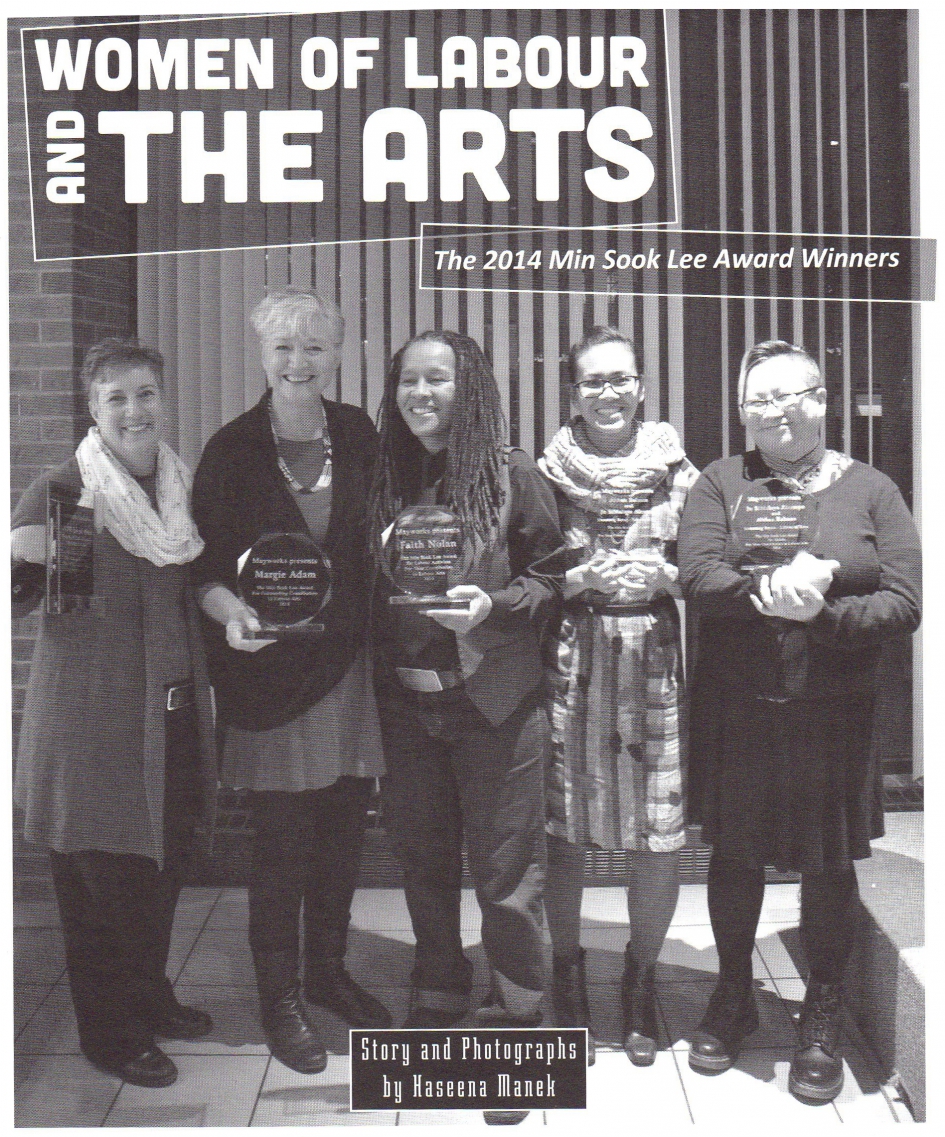The 2014 Min Sook Lee Awards

Story and Photographs by Haseena Manik
Our Time - March/April 2015
"PEOPLE DON’T UNDERSTAND," SAYS musician, singer/songwriter and community activist Faith Nolan. "They think labour is two old white guys hammering a nail who want more money and to work less. They don’t see that those two old white guys, along with white women and brown and black and yellow women and men, are doing this labour to have the right to a life. People have a disconnect in this sense."
Born in Halifax, Nolan grew up in Regent Park, a social housing project in downtown Toronto. She has toured all over Canada, the United States, and Europe. She has helped form social justice choirs and recorded albums with, among others members of the Canadian Union of Public Employees (CUPE) the Service Employees lnternational Union (SEIU) and the Elementary Teachers of Toronto (ETT).
This past year she was also one of six women recognized for their outstanding contributions to the arts and the labour movement. The ceremony took place on November 29 at the third annual Min Sook Lee Labour Arts Awards gala, hosted by the Mayworks Festival of Working People and the Arts. I had the pleasure of speaking to all five award winners about their work as artists, and about labour and the arts, in particular.
Packed with the award winners’ friends and families, as well as members of the Toronto labour arts community, the Steelworkers Hall on Cecil Street had a warm and familial atmosphere. Dinner was provided by the East African Community Association and the evening's agenda was punctuated by music...
(check out OurTimes for the full article)
... among existing union members? Ferguson says listening to members’ concerns and maintaining transparency are essential. "In our current structure, workers who have problems or perceived problems with their union structure sometimes end up trying to decertify, or they get persuaded into a raid position. Our current structure has no transparent system that takes the concerns of union members seriously." Even when complaints originate from "puppets for management" or members simply lacking a well- developed understanding of political ideology, they should not be casually dismissed. "Unions can be a giant force for good," she stresses. ''I think it's damaging that dissenters end up at the labour board, or entertaining decertifications, or with ‘rat unions."'
Not every effort meets with long-term success. Ferguson describes one manufacturing facility that organized, but then closed, in 2014. "There are places where we are losing jobs, there's no way to get around it," she says of the changing landscape of Canadian work. Yet some communities possess a cultural climate she associates with understanding the role of unions and how they assist in hard times. The organizing coordinator says she encountered this attitude during her six months in Detroit. She says she met plenty of people who "get it" there. "Not everybody clings to the explanation that 'unions aren't doing enough” to preserve jobs, argues Ferguson.
"My own family's experience was 'lt's too bad that Dad had to go through that alone, without an orga- nization behind him’ when he was laid off, because if that was my mom, she's at a hospital and everyone's in the union, and it would be a whole different scene."
The "scene" could go further if unions reached a wider audience with their message. "I think unions are the only organizations that truly have the power to engage in widespread political education. This is severely lacking," the thoughtful activist points out. "Unions are in a unique position to educate workers and the broader public about the history of this economy. If we trained frontline stewards, staff reps and organizers about the history of our economy and the lessons of social movements, we would have much more ambitious goals, for a world without racism and poverty."
Though many Canadian manufacturing jobs have been moved overseas, to nations with abysmally low standards for wages and workers' rights, Ferguson observes an emerging trend: "There is a small niche market for high—end stuff that's being made in Canada again," such as Canada Goose parkas. Garment workers with that company, incidentally, have long been represented by Workers United Canada. "As much as some places are closing their doors, other doors are opening," she says with conviction. Ferguson could be speaking about workers in the manufacturing sector, about the labour movement, or about her own life. Her words apply to all three.
Melissa Keith is a freelance journalist and former radio broadcaster living in Lower Sackville, Nova Scotia.
